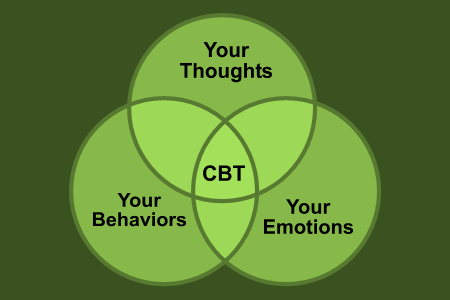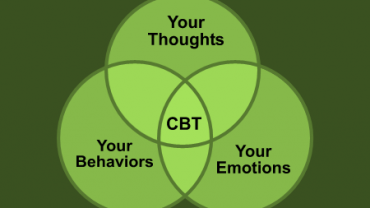Psychologists are committed to finding the solutions to all our anxieties, fears, and the mental blocks that shape our lives. In exploring the behavioral sciences, they have come up with an interesting treatment called Cognitive Behavior Therapy or CBT for short. CBT is one of many psychological treatment methods that is based on the idea that thinking of the positive and wonderful things in life can alleviate many of our ailments.
For example, someone who has a mental barrier that they simply cannot complete a task, a project, or reach any goal, has already failed. Although there may be stress and some discomfort in overcoming the barriers in our lives, it is important to persevere and envision ourselves reaching that goal instead of giving up and calling it a day. CBT is a very rational process that seeks to break down mental abnormalities to allow patients to live a fuller life.

In order to effectuate CBT, a psychotherapist must work with patients to pinpoint negative thought patterns and behaviors. Once it is found that dwelling on a deceased lover, for example, is not healthy for our emotional or socio-economic state, the patient can find something positive to fixate on and constructive to do instead of harboring on their losses. This may be to think positively about finding a date who is like a brother to the husband once lost who will solve the economic and companionship void that the deceased lover left. Let’s consider 7 things you need to consider before undergoing CBT, below.
#1: When is CBT Used?
Before you sign up for CBT sessions, you may want to consider whether your ailments are commonly treated by CBT or some other therapy. CBT is generally useful for dealing with depression, anxiety, phobias, lack of confidence, gambling, hoarding, anger management, obsessive thinking, ADHD, and even relationship problems. If there are thoughts and behaviors at the root of any problem or disorder, CBT may be the solution.
#2: Is CBT Effective?
Because it is very easy to measure the results of CBT, it is easy to prove its effectiveness. When patients are able to make a curt change in their behaviors and thought patterns, the effectiveness of the CBT treatment quickly becomes manifest. In most cases, people have some sort of mental block that releases stress hormones and other negative feelings when they try to change their thoughts and behaviors. This is where a psychotherapist can come into play with advice that helps them work through it and get over the hump by looking at the bright side.
#3: What Happens in a CBT Session?
At your initial CBT session, most of the basics will be covered to assess what the problem is while forming a rough idea of your goals. It may take time to identify all the specific thought patterns that are leading to the unwanted behaviors. This is where a psychotherapist will help probe your mind to identify unusual thought patterns.
#4: What Happens After a CBT Session?
Once your psychologist has developed a strategy to help you stop negative thought patterns and behaviors, you may be instructed to meditate or engage in other therapeutic activities. You will likely be asked to record various emotional states during the day and to write down what you are thinking. You may be asked to look at an instruction anytime that you encounter a doorknob, for example. If the instruction is a reminder that you have to touch your nose, eyes, or mouth to get sick from pathogens, and to simply wash your hands before meals, this may instill a rational calming effect to overcome the psychological barrier.
Many people get into stupid habits because they lack wisdom. Someone may develop a habit of scrubbing out their ears excessively because they don’t realize that ear wax has antibacterial properties, and that their ears feel clogged because of eustachian tube sinus issues.
#5: What if I Have Deep Subconscious Problems?
CBT is focused on treating symptoms based on the current thoughts of the patient. In this manner, they may be able to reduce or mitigate the effects by at least reducing the activity of overactive nerves when thought patterns are invoked. However, some patients have deeply held thought problems that are too intense for CBT to fully resolve. In these cases, CBT may be used to quickly mitigate the symptoms while other treatments like psychodynamic therapy are used to probe deeper.
#6: Can I Apply CBT Casually in My Own Life?
If you are counting calorie deficits, making efforts to focus on the positive aspects of your life, analyzing your negative behaviors and thinking how to change them, then you are essentially applying CBT. When you analyze and deconstruct negative behaviors, you are making a choice for the better to eliminate any bad habits.
#7: What Are the Costs of CBT Therapy?
CBT therapy is usually covered by health insurance to offset or eliminate any out of pocket expenses. The sessions are usually shorter than with other forms of intensive mental probing and relationship development. Some psychologists may even offer an income-based scale of payment or charge as much as $200 per session if your insurance does not cover it. In most cases, it is probably cheaper to sign up for an insurance plan to pay for your CBT therapy.
Conclusion
If you feel that your problems in life stem from negative thought processes and abnormal behaviors, you may be a good candidate for CBT. Although there are many other types of therapy available, CBT is one with cut-and-dried results that demonstrate the value of psychotherapy sessions. Having someone to talk to about all your problems is always beneficial because it helps you think more objectively about how to solve them. Contact Dr Jane Zhao-O’brien Psychologist if you think that CBT is something that you are interested in exploring. She will evaluate your problem and suggest the best course of treatment based on her years of experience in helping people just like you.











